This is not a Facebook Live of a rotating thunderstorm
- Published
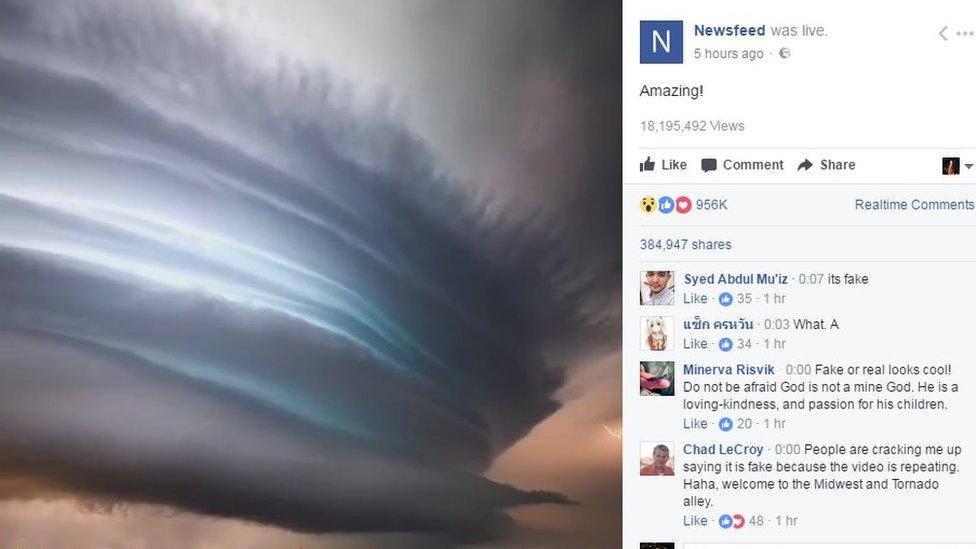
A Facebook Live video, external purporting to show a mesmerising storm has been outed by social media users as a fake.
The moving image of the circling clouds began appearing in social media timelines earlier this week.
But it was a Facebook Live posted by New York-based NewsFeed, external on Wednesday where it built momentum - racking up a staggering 18 million views within five hours of being broadcast.
In fact, storms like this are not uncommon, but some viewers were duped into believing they were watching a live storm which was in fact a gif made by photographer and artist Jonathan Wennstrom, external earlier this month.
He created it using a photograph taken by storm chaser Marko Korosec, external of a real cloud formation in South Dakota two years ago.
Many Facebook users were quick to point out that the four hours of live footage was not real.
One user commented: "The recording is being played over and over. The cloud on the right isn't moving. There are no cars on the road. The lightning on right is in the same spot and not moving. Please do better next time."
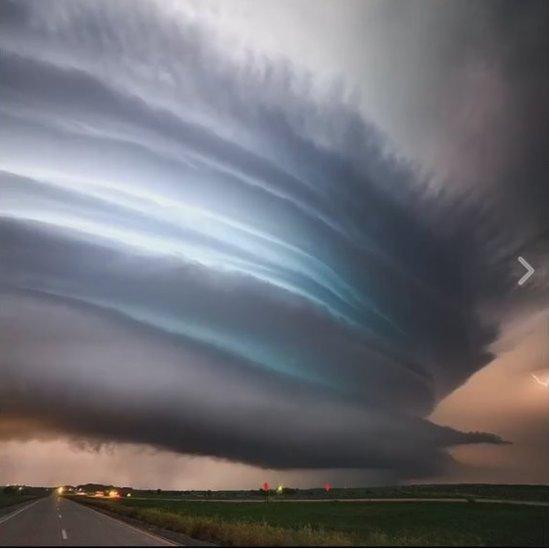
BBC weather presenter Nick Miller says: "This clearly looks like footage on a loop. Although not completely impossible, the blue light coming from inside the cloud is odd. We would expect it to be more of an orange colour.
"Cloud formations like this are known as rotating thunderstorms or super cell thunderstorms but this looks like it's been added on top of an image. We cannot say which part of it is real or fake. The image, the storm or both."
The BBC was later contacted by the photographer behind the image who explained it was a genuine snap of a storm.
Authenticity clues
Another giveaway is the lack of information. It doesn't offer any extra details about where the storm took place, or when.
Many Facebook commentators also pointed out the sound of booming thunder and crackling lightning which accompany the video were in fact sound effects played on a loop.
Shortly after the live, another Facebook page The Cherry Orchard, external, which also claims to be a news company in Los Angeles, broadcast the storm footage as a Facebook Live to more unsuspecting viewers.
"Wow that's awesome," posted one Facebook user., external Another commented: "It's beautiful."
Although attracting fewer views than the NewsFeed live, many Facebook users jumped into the comments again to question the video's authenticity.
An eagle-eyed Facebook user commented, external: "It's not true, because the sound is just repeating and the image below is a photograph, because you can not even notice the plants moving."
Some mentioned the lights from traffic in the image were the same throughout the broadcast, while others said it was a three second gif or screensaver.
A frustrated Facebook user posted: , external"This is not live. I shared this picture yesterday! It's on a loop with sound added. I can't believe so many of you are so gullible lol."
Although Facebook has promised to crack down on so called fake news, it is not the first time a Facebook Live has claimed to be something it wasn't.
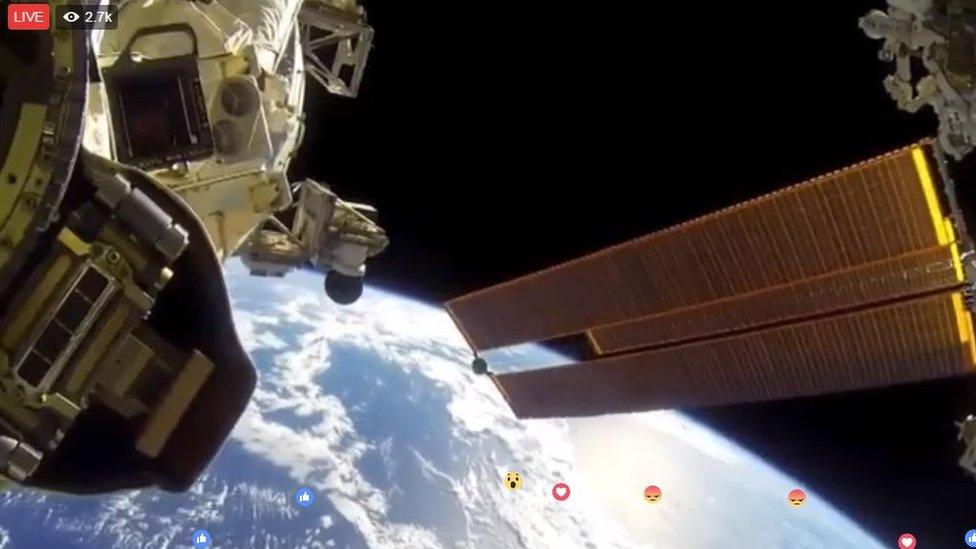
Last October, Facebook Live viewers were duped into believing they were watching a live broadcast from Space posted by Unilad , externaland USA Viral.
Seventeen million believed thought they were looking at live pictures of astronauts in space suits apparently working outside the International Space Station with amazing images of Earth in the background.
In fact the footage was old with part of it being filmed by astronaut Terry Virts , externalin 2015 and another part from a spacewalk by Russian cosmonauts, external in 2013.
In May, Facebook broadened its campaign to raise awareness about fake news, by publishing adverts for social media users. They include tips for spotting fake news, including checking the article date and website address, as well as making sure it the news isn't intended as satire.
The platform says it has already removed "tens of thousands" of fake Facebook accounts and that systems were now monitoring the repeated posting of the same content.
By Rozina Sini, BBC's UGC and Social News Team
- Published3 November 2016
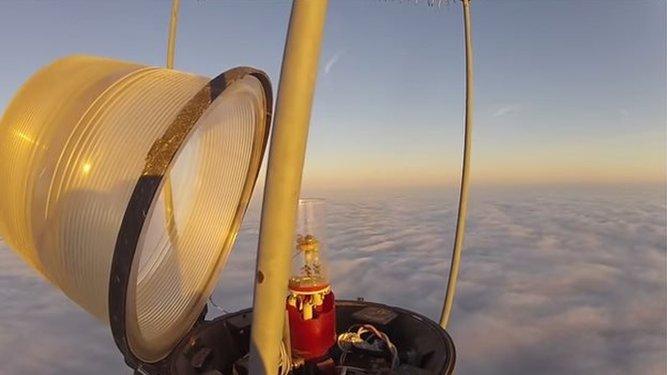
- Published8 May 2017
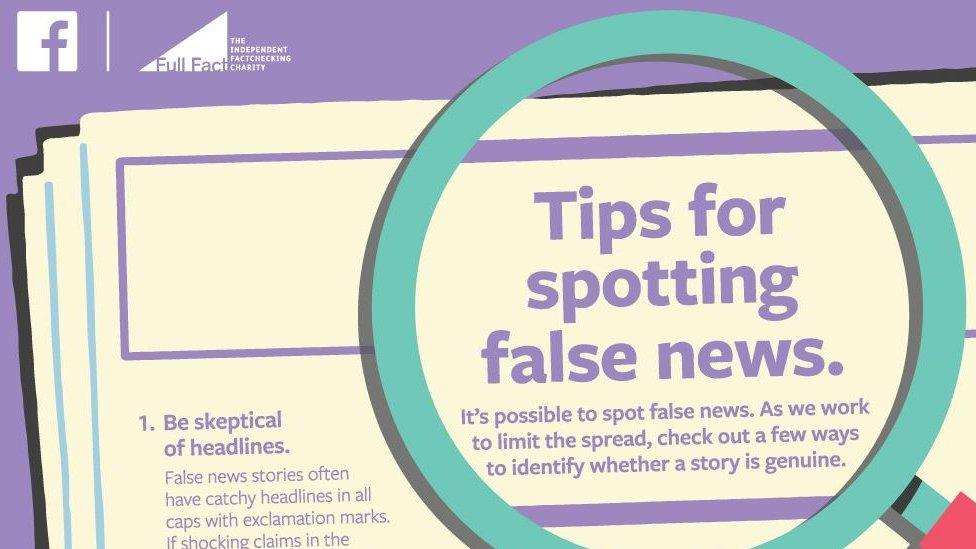
- Published1 June 2017
